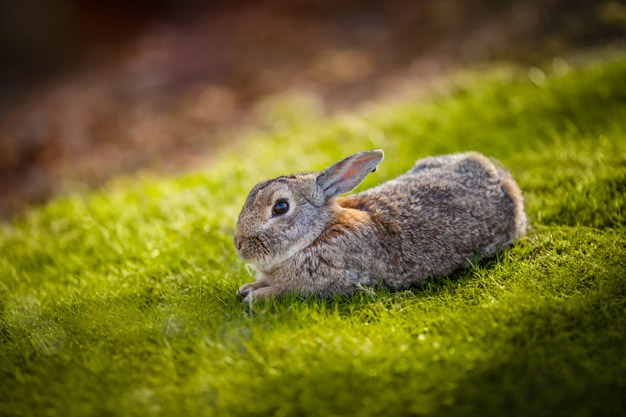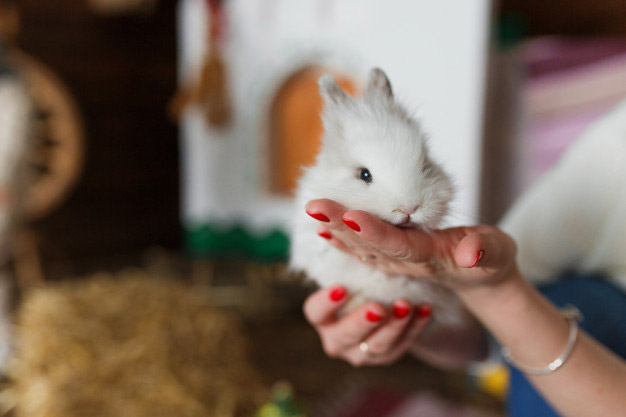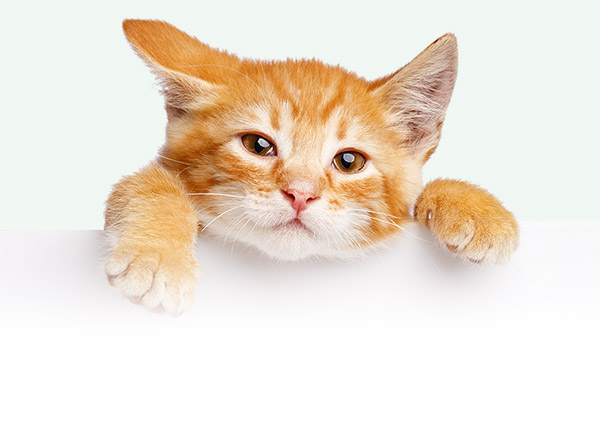Rabbits are easy to litter train, quiet and full of personality making them great house pets! They do require some extra care and precautions so it’s important to do your research before deciding if one is right for your home.
Some of our doctors have a special interest in providing medical care for rabbits. Our services include general health examinations, limited emergency care and spay and neuter surgery. At this time, we do not carry any rabbit specific vaccinations. =Common rabbit emergencies include pain, wounds or decreased appetite. Depending on your rabbit’s medical needs we may recommend you seek out further care from veterinarians that are specialized in exotic medicine. If your rabbit needs to be seen, we ask that you call first to ensure that we have a veterinarian experienced in rabbit care available to see your pet.
If your rabbit is suffering any of our veterinarians can provide humane euthanasia services.

Rabbit Housing
Rabbit housing should be a minimum of 2ft by 2 ft for small rabbits. Many enjoy having a larger area to roam so setting up a rabbit proofed “Rabbit Room”, puppy pen or large rabbit condo work great! They should have plenty of room to move around and stretch out with areas for food and water. If you have more than one rabbit, larger spaces are required.
Water bottles are the easiest for keeping clean, fresh water available for rabbits. Clean bottles weekly with a mild dish soap, rinsing well before refilling with filtered or bottled water. Some rabbits prefer drinking out of bowls, but the water should be replaced daily and the bowl should never be empty.
Bedding should consist of shredded newspaper or hay. Litter boxes should have either a recycled paper product (Carefresh or Yesterday’s News) or corn cob. Wood shavings can cause liver and respiratory illnesses, so we do not recommend them for any pet. Clay litters expand in the stomach and can cause gastrointestinal blockages, so we never recommend clay litter for rabbits, guinea pigs, or other small furry friends
Rabbits should be let out of their cages at least 3-4 hours daily for exercise. You can let them hop around inside a small room of your house, but be careful of carpet, furniture, and electrical cords, as they have a natural tendency to chew on everything.
It is best to wrap electrical cords with plastic cord protectors (several layers work best) or use wood panels to cove outlets and cords. You can use cardboard boxes as well, though rabbits will chew on them and you will need to replace them regularly.

Rabbit toys are an important addition to your rabbits living space. Toys are important to prevent boredom, provide exercise and give them something to chew on, as their teeth grow continuously and need to be worn down. Good toys include: Straw and Hay Mats, Timothy hay (oat /orchard grass hay), Dried cholla,
Dried gourds, Mineral licks, Bermuda grass, Unvarnished wicker baskets, Paper bags to hide in, Toilet paper/paper towel rolls, Phone Books for shredding, Cat toys (roll or toss), Napkin holders (wooden or ceramic), Cardboard boxes, Wooden bird toys.
Outside Rabbit Considerations
Rabbits overheat easily! You can keep your pet outdoors, but make provisions so it can stay cool during Arizona’s hot summers. Temperatures above 85 degrees are not safe for your pet. To help keep your outside rabbit stay cool keep their hutch in a shaded area and set up 2-3 frozen gallon jugs of water around for the rabbits to lie against. You will need to check these jugs daily several times a day, and change them out with fresh jugs as they will melt quickly during summer. You can also get a box fan that doubles as a swamp cooler, but these work best in small areas and during the dry summer months (not the monsoon season.)
Rabbits are prey animals. If you have your rabbit outside, remember that it is prey to numerous species such as hawks, owls, cats, and coyotes. Keep your pet safe by building an appropriate rabbit enclosure, or don’t leave it outside unsupervised.
General Rabbit Healthcare

Clip nails regularly. Most rabbits require a nail trim once a month. If a rabbit’s nails are not clipped monthly, they become overgrown and may snag on carpet or cage material causing the nail to tear, break, and bleed.
Spay or neuter your pet! Altering your rabbit increases its life expectancy and betters their overall health. It also reduces behavioral problems such as spraying/marking territory, fighting other rabbits, cage aggression, and producing additional bunnies. Spaying eliminates chances of uterine infections, ovarian cysts, and cancers of the uterus or ovaries. It also helps prevent breast cancer.
Never keep intact males together. They are very territorial, and will likely attack each other causing serious injury or even death.
Rabbit Nutrition
Never let a rabbit go without hay. They should always have an ample supply of timothy hay available. Hay provides the much-needed fiber for their digestive tract. Other grass hays (oat hay, orchard grass) also provide a large amount of fiber, but these can be more difficult to find. A lot of fiber means firmer poop, fewer fur balls, and an overall healthier pet.
Alfalfa hay is only a treat. Alfalfa contains too much calcium, protein, and carbohydrates, which can lead to obesity, kidney and bladder stones, and gastro-intestinal upset. Alfalfa may be fed to pregnant, nursing does, post-fracture rabbits and young rabbits.
Pellets are not a necessity. Although most bunnies love their pellets, it should be offered only as an added supplement to their diet. Timothy hay pellets (versus the common alfalfa hay pellets) are preferred, and should only be given in small amounts based on the pet’s ideal weight. Give a maximum of ¼ cup pellets per 4 pounds (1.8 kg) of body weight daily if your pet is not overweight. Just remember that feeding too many pellets can lead to obesity and dental problems.
Feeding a variety of leafy greens along with the unlimited hay prevents boredom and provides essential nutrients. It is very important to purchase organic fruits and vegetables (no pesticides) and rinse dirt/debris off before feeding to your rabbit. Good greens for bunnies include: Kale, Cilantro, Parsley, Red leaf lettuce, Carrot tops, Grass, Spinach, Mustard greens, Green leaf lettuce, Turnip greens, Basil, Spearmint, Collard greens, Romaine lettuce, Radish tops, Celery tops, Dandelion greens, Endive, and Arugula.



